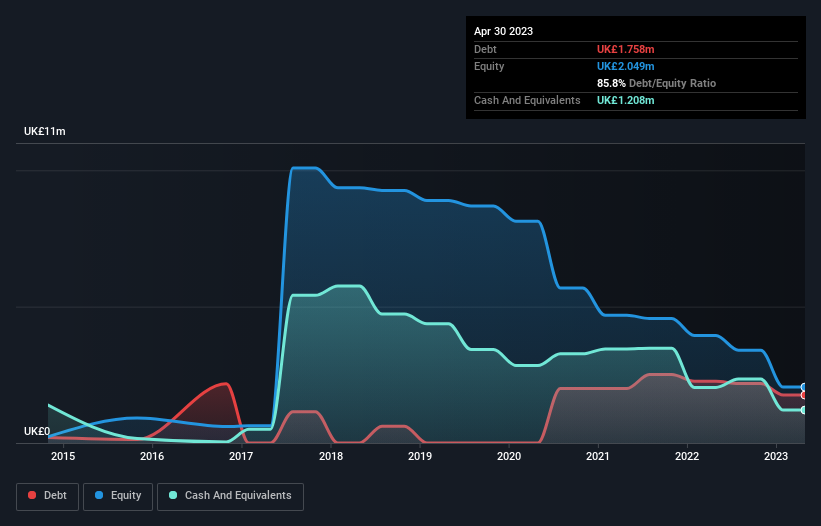- United Kingdom
- /
- Aerospace & Defense
- /
- AIM:VEL
Does Velocity Composites (LON:VEL) Have A Healthy Balance Sheet?

Legendary fund manager Li Lu (who Charlie Munger backed) once said, 'The biggest investment risk is not the volatility of prices, but whether you will suffer a permanent loss of capital.' When we think about how risky a company is, we always like to look at its use of debt, since debt overload can lead to ruin. We can see that Velocity Composites plc (LON:VEL) does use debt in its business. But the real question is whether this debt is making the company risky.
What Risk Does Debt Bring?
Debt and other liabilities become risky for a business when it cannot easily fulfill those obligations, either with free cash flow or by raising capital at an attractive price. In the worst case scenario, a company can go bankrupt if it cannot pay its creditors. However, a more frequent (but still costly) occurrence is where a company must issue shares at bargain-basement prices, permanently diluting shareholders, just to shore up its balance sheet. Of course, the upside of debt is that it often represents cheap capital, especially when it replaces dilution in a company with the ability to reinvest at high rates of return. The first step when considering a company's debt levels is to consider its cash and debt together.
View our latest analysis for Velocity Composites
What Is Velocity Composites's Net Debt?
As you can see below, Velocity Composites had UK£1.76m of debt at April 2023, down from UK£2.26m a year prior. However, it does have UK£1.21m in cash offsetting this, leading to net debt of about UK£550.0k.

How Healthy Is Velocity Composites' Balance Sheet?
We can see from the most recent balance sheet that Velocity Composites had liabilities of UK£5.30m falling due within a year, and liabilities of UK£3.00m due beyond that. Offsetting these obligations, it had cash of UK£1.21m as well as receivables valued at UK£2.98m due within 12 months. So it has liabilities totalling UK£4.12m more than its cash and near-term receivables, combined.
Velocity Composites has a market capitalization of UK£13.5m, so it could very likely raise cash to ameliorate its balance sheet, if the need arose. But it's clear that we should definitely closely examine whether it can manage its debt without dilution. The balance sheet is clearly the area to focus on when you are analysing debt. But it is Velocity Composites's earnings that will influence how the balance sheet holds up in the future. So if you're keen to discover more about its earnings, it might be worth checking out this graph of its long term earnings trend.
In the last year Velocity Composites wasn't profitable at an EBIT level, but managed to grow its revenue by 17%, to UK£13m. That rate of growth is a bit slow for our taste, but it takes all types to make a world.
Caveat Emptor
Over the last twelve months Velocity Composites produced an earnings before interest and tax (EBIT) loss. Its EBIT loss was a whopping UK£2.0m. When we look at that and recall the liabilities on its balance sheet, relative to cash, it seems unwise to us for the company to have any debt. So we think its balance sheet is a little strained, though not beyond repair. For example, we would not want to see a repeat of last year's loss of UK£2.1m. So to be blunt we do think it is risky. There's no doubt that we learn most about debt from the balance sheet. However, not all investment risk resides within the balance sheet - far from it. For instance, we've identified 4 warning signs for Velocity Composites (1 is concerning) you should be aware of.
If you're interested in investing in businesses that can grow profits without the burden of debt, then check out this free list of growing businesses that have net cash on the balance sheet.
New: Manage All Your Stock Portfolios in One Place
We've created the ultimate portfolio companion for stock investors, and it's free.
• Connect an unlimited number of Portfolios and see your total in one currency
• Be alerted to new Warning Signs or Risks via email or mobile
• Track the Fair Value of your stocks
Have feedback on this article? Concerned about the content? Get in touch with us directly. Alternatively, email editorial-team (at) simplywallst.com.
This article by Simply Wall St is general in nature. We provide commentary based on historical data and analyst forecasts only using an unbiased methodology and our articles are not intended to be financial advice. It does not constitute a recommendation to buy or sell any stock, and does not take account of your objectives, or your financial situation. We aim to bring you long-term focused analysis driven by fundamental data. Note that our analysis may not factor in the latest price-sensitive company announcements or qualitative material. Simply Wall St has no position in any stocks mentioned.
About AIM:VEL
Velocity Composites
Provides engineered composite material kits and related products to the aerospace industry in the United Kingdom, Europe, the United States, and internationally.
Good value with reasonable growth potential.
Market Insights
Community Narratives



